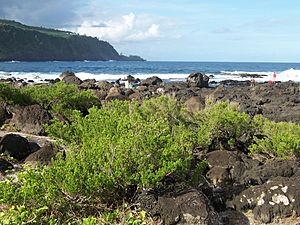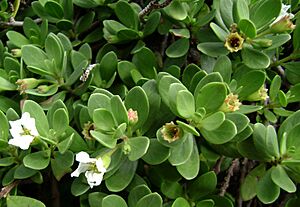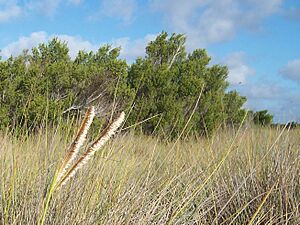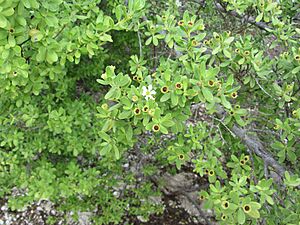Bantigue facts for kids
Quick facts for kids Bantigue |
|
|---|---|
 |
|
| Pemphis acidula bushes on the shore of Réunion Island | |
| Conservation status | |
| Scientific classification |
|
| Kingdom: | Plantae |
| Clade: | Tracheophytes |
| Clade: | Angiosperms |
| Clade: | Eudicots |
| Clade: | Rosids |
| Order: | Myrtales |
| Family: | Lythraceae |
| Genus: | Pemphis |
| Species: |
P. acidula
|
| Binomial name | |
| Pemphis acidula J.R.Forst & G.Forst
|
|
| Script error: The function "autoWithCaption" does not exist. | |
| Synonyms | |
Script error: No such module "Check for conflicting parameters".
Pemphis acidula, also known as bantigue (say: bahn-TEE-geh) or mentigi, is a type of flowering plant. It belongs to the Lythraceae family. This plant is a kind of mangrove that grows in warm, tropical areas. You can find it on rocky coasts across the Indo-Pacific region. This area includes parts of the Indian and Pacific Oceans. For a long time, people thought Pemphis acidula was the only plant in its group, called Pemphis. But now, scientists believe there might be at least one more species.
Contents
Where It Grows
Pemphis acidula is a special bush that loves salty places. It grows along the coasts in warm, tropical parts of the Indo-Pacific. This plant is a halophyte, meaning it can grow in salty soil. You can find it in sandy and chalky soils near the ocean. It also thrives in mangrove forests. These are special forests that grow in salty water along coastlines.
How People Use It
The wood from Pemphis acidula is very strong and heavy. It also resists rot and doesn't easily change shape. Because of these qualities, people have used it for many things. It has a naturally smooth finish. People make walking sticks, fence posts, and tool handles from its wood. Some even used it to make small anchors.
Traditional Uses
In places like Réunion and Mauritius, people call it bois matelot. This means "sailor's wood." In the Maldives, this tough wood was used to build traditional ships. It helped hold the planks of the ship's hull together.
Bonsai Plant
Pemphis acidula is also very popular for bonsai. Bonsai is the art of growing miniature trees in pots. This plant is great for bonsai because it loves tropical weather. It can even survive strong storms like typhoons. It is the most common plant used for bonsai in the Philippines. You can also find it grown as bonsai in Taiwan and the Ryukyu Islands in Japan.
Because it's so popular, many people want to collect Pemphis acidula from the wild. This has made it a threatened species in the Philippines. It is now against the law to collect, sell, or transport wild Pemphis acidula in the Philippines. Breaking this law can lead to fines and even jail time.
Tools and Weapons
On Marovo Island, Tonga, Tahiti, and other South Pacific islands, people use this wood to make tools. They craft things like pestles (for grinding food), tool handles, weapons, and combs.
Leaves, Flowers, and Fruits

Closeup of flowers and young leaves; Tonga.
|




